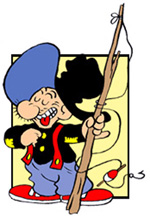|
|
Posts: 638
Location: Bloomington, MN | Strange “gold” Largemouth Weighed-in at Quinte Series Event
The attached photo of a strange-looking “gold” Largemouth Bass was taken by one of our crew (Rachael Hornsby) at a recent Quinte Series tournament on the Bay of Quinte. Although it had a striking gold colour, the Tournament Directors agreed (correctly in our opinion) that it was a Largemouth based on other features and it was allowed to be weighed in.
On Monday, we decided to consult some of the experts in the Biology Department at Queen’s University to determine how a Largemouth could ever look like this. We thought that the explanations could provide an interesting lesson about colour in fish (& other animals) for a broader audience, so we decided to turn this into another post for our Facebook page.
The first potential explanation is that this is the result of a recessive gene present in the population (similar to blue eyes in humans). This seems unlikely because it would probably occur much more frequently if this was the case.
A better explanation is that this is the result of a rare genetic mutation. In this case, one of the genes that contributes to the normal process of colour formation in the scales has probably undergone a random mutation and is not functioning properly.
For those people that are interested in a little more detail on this topic, here is the full explanation provided by Dr Robert Montgomerie*…
“Normally, the fish scales receive incoming white light and different molecular structures convert white light to blue or yellow, which make the fish look green. In the yellow (gold) bass, it is likely that some spontaneous mutation occurred that prevented the scales from making the proper molecular structures to convert white light to blue. Without the structures that convert white light to blue, the fish looks yellow (gold) rather than green (which is what you see when blue and yellow combine). It’s not that the bass has gained a yellow pigment but rather lost the ability to produce the blue colours that make its scales look green.”
*Dr Robert Montgomerie is a Professor and Research Chair in Biology at Queen’s University. His areas of expertise include evolutionary biology & animal colouration
Edited by Clark A 9/17/2015 10:46 PM
Attachments
----------------
 gold largie 1.jpg (100KB - 581 downloads) gold largie 1.jpg (100KB - 581 downloads)
 gold largie 2.jpg (111KB - 568 downloads) gold largie 2.jpg (111KB - 568 downloads)
 gold largie 3.jpg (164KB - 574 downloads) gold largie 3.jpg (164KB - 574 downloads)
|
|
| |
|

Posts: 20277
Location: oswego, il | In northern Wisconsin these are referred to as golden delicious. |
|
| |
|
Posts: 81
| I once dated a blonde largemouth.
|
|
| |
|

Posts: 337
Location: Watersmeet, Michigan | Very cool. (Did anyone think to check it for radiation?)
Fr. K |
|
| |
|
Posts: 12
Location: Twin Lakes, WI | I think it was hanging out with the local gang of Carp! |
|
| |
 Not muskie related, but interesting! A Gold Largie!
Not muskie related, but interesting! A Gold Largie! Not muskie related, but interesting! A Gold Largie!
Not muskie related, but interesting! A Gold Largie!